| Spotlight
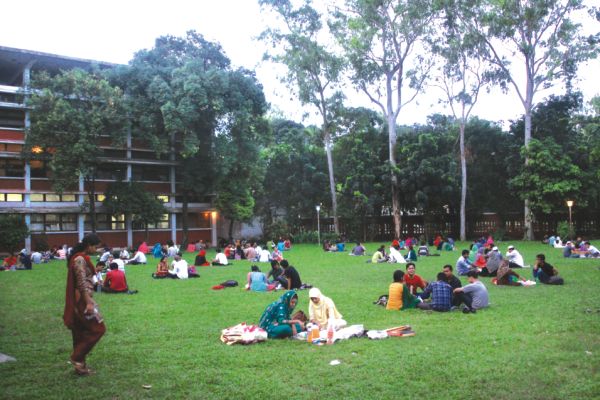
Iftaar Galore on Campus!
Rakibul Hasan
Photos: Kazi Tahsin Agaz Apurbo
The holy month of Ramadan is here. What makes this month unique in Bangladesh are the assortment of makeshift shops selling delicious iftaar items, brightly decorated shopping malls and the never ending tailbacks of vehicles on the roads. Both public and private universities remain open until one or two weeks prior to Eid-ul-Fitr. Moreover, this year Ramadan is spanned between the months of July and August when midterm exams and class assignments are due in most of the universities. As a result, a lot of students have to take iftaar on campus. For residential students living in university dormitories, homemade iftaar is not an option, whilst many non-residential students opt for iftaar on campus, and not get into the huge gridlock on the way back home, caused by the outrageous traffic jam. Bad traffic jams becoming a permanent element of being a Dhakaite, most students make the most of having iftaar on campus -- a hang out with friends, a period or relaxation from a day filled with attending classes and doing assignments while fasting and also tasting the delicious iftaar on campus, specially made keeping the students in mind.
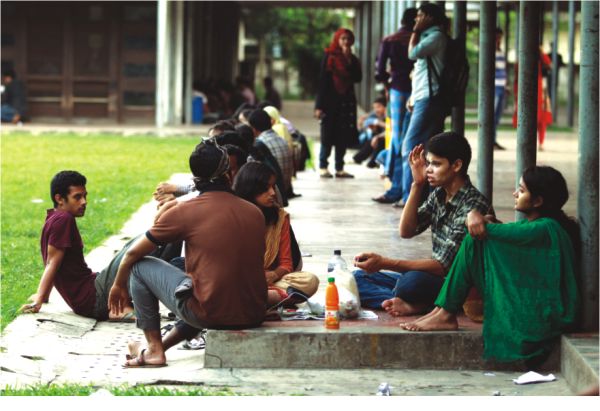
Iftaar on campus involves having a good time with friends.
So where do students go to get the best iftaar on campus without burning a hole in their pocket? For Ashfaque Hossain, a Dhaka University (DU) student, the choices are aplenty. “With places famous for selling tangy, spicy iftaar items surrounding our campus such as Chankharpool, Nilkhet and Palashi bazaar, we have countless options to buy our iftaar from. Plus, cafeterias of every university dormitory sell traditional iftaar items such as piyaju, beguni, alur chop and chola in very economical rates -- ranging between Tk 5 - Tk 10 -- for each item. Iftaar boxes can also be bought for Tk 50, consisting of the aforementioned items,” says Ashfaque. He also adds, “My favourite place to have iftaar on campus is at the premises of TSC (Teachers Students Centre), the place becomes abuzz with the presence of both students and teachers just before iftaar. Many former DU students also come to the TSC along with their old friends to catch up and have iftaar. I enjoy the lively ambience and my iftaar is usually followed by long talks with my friends over steaming cups of ovaltine tea,” says Ashfaque.

A range of iftaar items can be found in makeshift shops.
For Ali Ahmad, another DU student and a resident of Surjasen Hall, iftaar parties become a daily phenomenon during Ramadan. “Usually I have iftaar with my two roommates in my dorm room. Moreover, we also invite our classmates to join us who stay back on campus. With so many options in hand, I usually partner up with my roommates and explore a new place every other day to hunt down iftaar items. I like to go to the Chawkbazaar for the jumbo sized Shahi Jilapi, countless number of kebabs and the famous Nurani sherbet -- a true delicacy to refresh your body and mind after a long day of fasting,” says Ali Ahmed. The delicious Nurani sherbet costs Tk 20 per glass and is also sold as takeaways in disposable bags. However, one has to make it to the Chawkabazar quite early during Ramadan to get hold of this heavenly elixir, since due to its high demand, the shop selling the sherbet (Nurani sherbet and lacchi) runs out of its supplies even two to three hours before iftaar time.
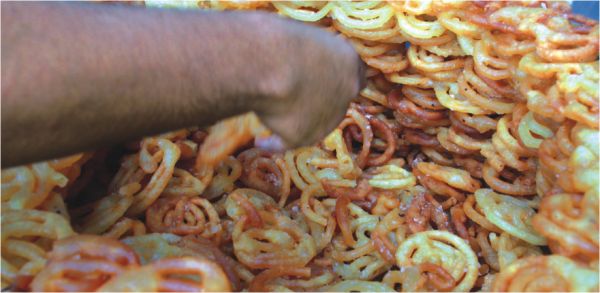
The delectable jilapi is a must-have on the iftaar menu.
However, if one is concerned about too much oil in traditional iftaar items like chop, piyaju and chola and opts for healthier options, a number of choices are still available for them. Muntasir Rahman Pavel, a student of Bangladesh University of Engineering and Technology (BUET) living in one of the university dorms explains his plan for this Ramadan, “Our campus is now closed but I have decided to stay in the hall until the week before Eid since I pay private tuitions. This year I am going for a healthy, balanced iftaar with items like chira, muri, gur (treacle), curd and fruits, all of which I can buy in kilograms from either Palashi bazaar or Chawk bazaar at a wholesale rate. The price of chira would be Tk 45 a kg, while the price of gur (treacle) fluctuates between Tk 60 to 70 per Kg,” says Pavel.

Fresh fruit juice to refresh one's body and mind after a long day of fasting.
As classes and exams are on full swing at private universities, the hectic schedule practically compels many students to have iftaar on campus. Apart from the regular iftaar items, private university students are interested to try out not non-traditional items for iftaar such as Chinese and Indian food. Universities like North South University, American International University Bangladesh and Independent University have their own cafeterias, where students can grab their iftaar from a wide range of menu. Adiba Islam an NSU student says, “For us NSUers, a myriad of options are available for iftaar. There are multiple cafeterias inside the NSU campus which sell a range of traditional and non-traditional iftaar items. As these cafeterias remain open till dusk, managing a quick iftaar on campus is not a problem.” Adiba also adds about some of her favourite items found in NSU cafeterias, “Of all the items I love to have the noodles (priced Tk 50 a plate) found in Magdonalds (a Thai-Chinese restaurant inside the NSU campus) for iftaar. One can also find set meals consisting of fried rice and curries in that restaurant. While a plateful of fried rice would cost Tk 50, vegetable and chicken curries can be bought at Tk 50 and Tk 70 respectively. There is also the 'Old Cafe', an eatery situated inside the NSU campus famous for selling exceptional iftaar items such as shashlick, chicken-ball and chicken jhal fry all of which costs between Tk 50 to Tk 70. The Old Cafe also offers an array of healthy and fresh fruit juices to students. The water melon juice costing only Tk 40 a glass, is a top choice by the students to quench their thirst during iftaar. Plus there are also lemonades costing Tk 15 a glass and mango juice costing Tk 80 a glass.
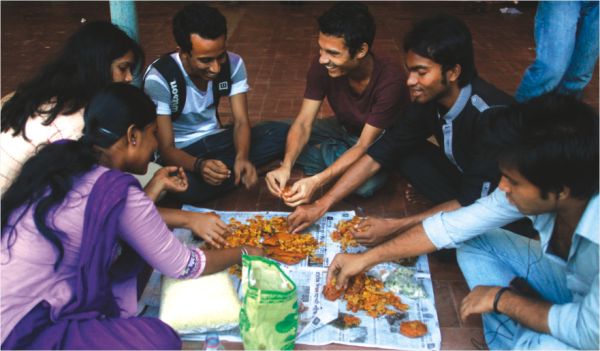
Friends get together during iftaar irrespective of their religious beliefs.
Nusrat Shikder, a student of North South University (NSU) says, “The best thing about iftaar in NSU is here, students can go for both economical iftaar or can also opt for slightly expensive items as well. While an iftaar box consisting of chola, muri, piyaju and alur chop at one of the NSU cafeterias would cost a student Tk 50 only, a number of famous restaurants are also available in the adjoining Bashundhara residential area such as Boomers, Ghoroya, Shawarma House and Hajir Biriyani, where students often go to have iftaar together. In case of a pre-planned iftaar party, everybody contributes to the expense incurred.”
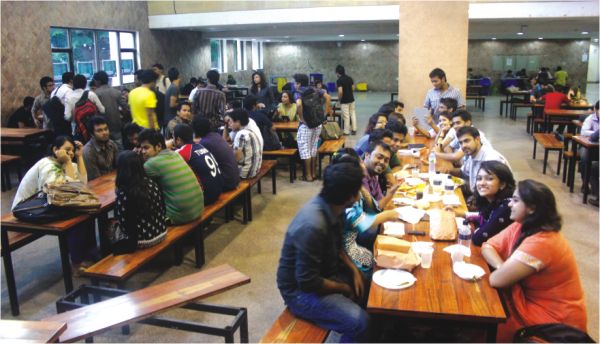
Students cherish these memories for life.
The idea of having iftaar on one's own campus is always special for students. Besides performing the religious duties of breaking the fast, saying prayers and joining in the merriment of drinking water or juice with a host of others, iftaar on campus also involves having a good time with friends and finger-licking delicacies. Friends get together during iftaar irrespective of their religious beliefs indicating the remarkable fact of how we can find unity despite all our diversities. These iftaar feasts often become a source of memorable moments on campus, for life.
|
